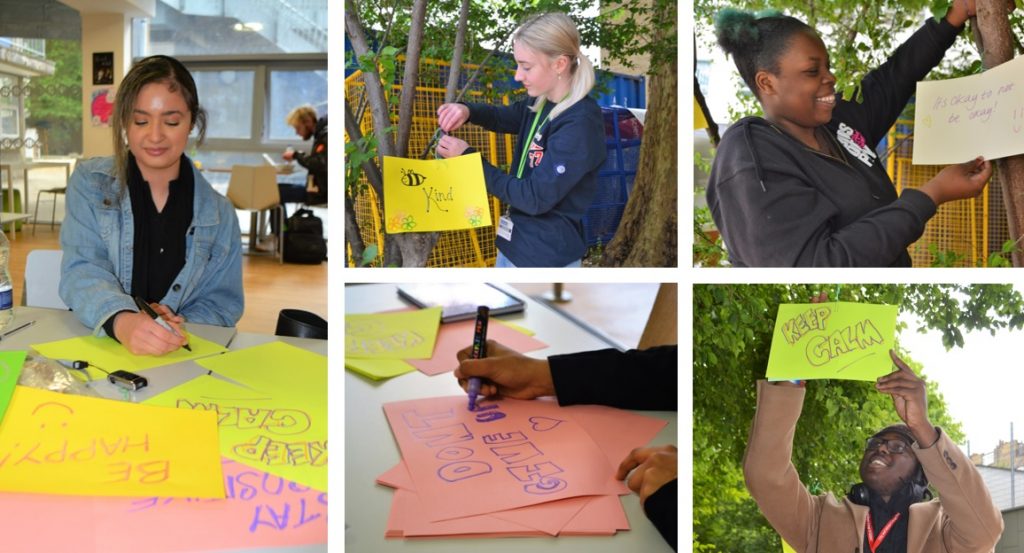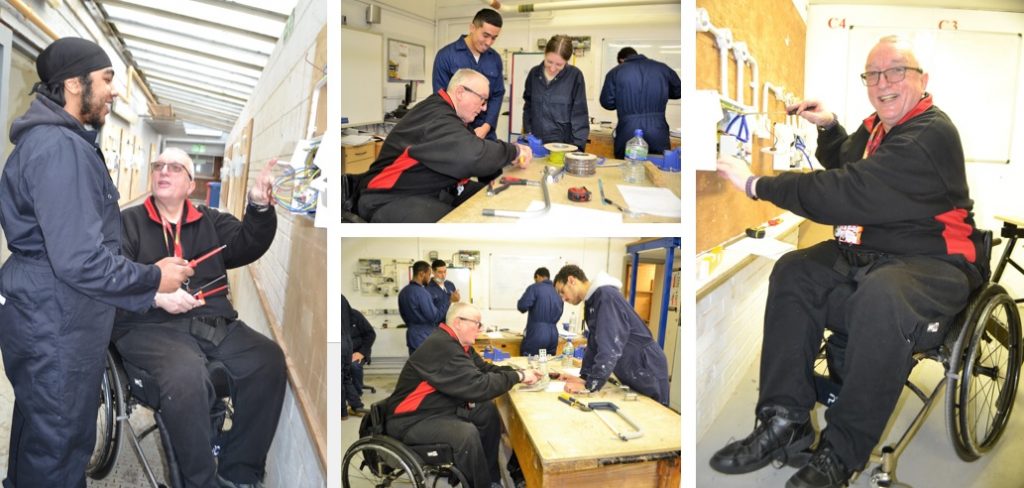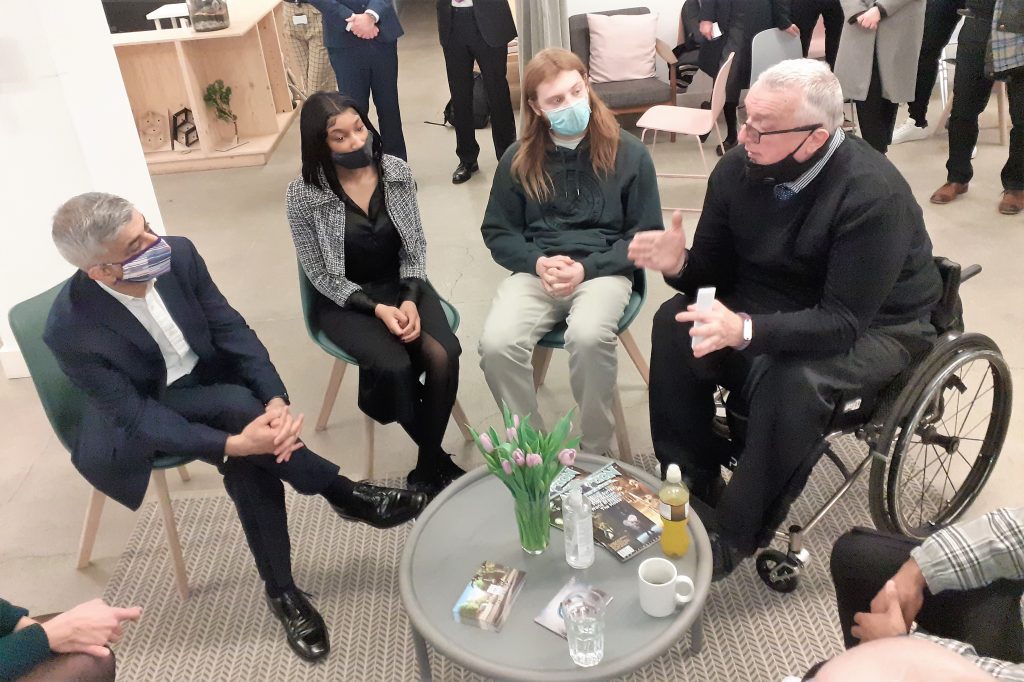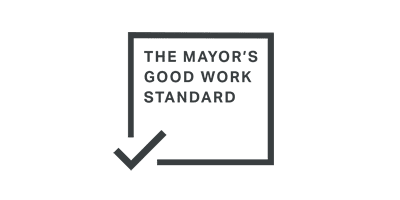Tag: entrepreneur
Students jumped on board a big yellow American school bus during a week of activities to improve their mental health and wellbeing ahead of their exams.
The bus from the Zen Project arrived at Westminster Kingsway College, as colleges across Capital City College Group marked Mental Health Awareness Week from 9-15 May.
According to the charity Mental Health UK, which is behind the annual awareness week, one in four people in the UK has experienced a mental health problem.
The Zen Project has converted the bus into a mobile studio where students could participate in breathing and meditation exercises and other relaxation techniques.
WestKing student Muhaned Nouman, 21, said: “The exams are now very near and I’m starting to feel a bit anxious. You study for the whole year and you’re scared that it could all be written-off in one paper and you won’t get the grades you deserve.
“Today has been really good at helping us all get away from that pressure. The breathing exercises on the bus made me feel very relaxed and have taken some of my worries away. My mind is a lot clearer and focused. I feel a lot more positive now.”
Students also took part in ‘Talk and Chill’ sessions, that included therapeutic workshops hosted by qualified psychotherapists and tips for managing exam stress.
Other workshops were run by Catch22, which provides practical and emotional support to young people and their families, and online mental health company Kooth.
WestKing music students performed live at the event, which also provided students with information about support available at the college.

City and Islington College (CANDI) ran sessions, around this year’s Mental Health Awareness Week theme of loneliness and the college held workshops for their students on exam stress, social anxiety and emotional resilience.
Students also took part in mindfulness activities including kindness rock making, and writing and designing colourful messages, which were then tied to trees to inspire their peers.
There was also a ‘Chat and Chillax’, ‘OK 2 Talk’, motivation, creative, meditation and safe space drop-in session and various physical activities including football, canoeing, box-fit and yoga.
CANDI student Rebecca Lynch, 16, recalled how her mental health had deteriorated during lockdown, making her feel alone and unable to share how she was feeling with family and friends.
She said: “I felt down and not in good place. I couldn’t even go out to clear my head. I was also home-schooled and didn’t have many friends and often felt left out because they all went to the same school.
“I’ve got exams coming up but I’m not stressing out as I used to, because at the end of the day they don’t define who you are as a person. Failing an exam is not the end of your life, you can always come back from that. I’m not saying it doesn’t matter, it’s just not as big a deal as it’s made out to be.
“The college has facilities to help you. Whether you use them or not, they’re always there. I feel they really do put students first and that mental health is top priority over academic success.”

Students at the College of Haringey, Enfield and North East London (CONEL) took part in mental health workshops at the college run by Barnet, Enfield and Haringey Mental Health NHS Trust.
The college regularly runs these workshops, with more than 300 students participating so far this year.
CONEL student Cameron Barrall, 16, said: “Growing up it’s not seen as normal for boys and men to open up about their feelings and suffer in silence, and when you do people are like ‘Get over it, get a grip, cheer up,’ but saying things like that just makes it worse.
“If I’m struggling with something, I just go out and want to be by myself and don’t feel like I need anyone around me, but sometimes that is more difficult and it can help to talk to a family member or someone close to you who you can trust.”

‘I started my own mindfulness business after battling depression’
CONEL student Amaya Agdomar, 45, started her own business Sacr3d Butt3rfly after facing her own mental health battle with anxiety and depression. She organises mindfulness walks and activities in Epping Forest to lift people’s spirits through an appreciation of nature. The threes in Sacr3d Butt3rfly refer to mind, body and spirit.
“There were times when if the NHS hadn’t been there I would found life very difficult. They helped me through and because of that I wanted to start a business helping people who’ve been in my situation in a place with people who care. I was going into Epping Forest myself and feeling all the benefits that have helped with my recovery.”
Nearly 300 students at CONEL have also taken part in Soft Skills For Wellbeing workshops run by the Barrier Breakers Foundation, a charity which helps disadvantaged young people develop skills to reach their potential and enrich their lives.
This week the college also hosted a stand providing information on mental health services available across Haringey, run by Haringey Council, Haringey Mind and the NHS.

All CCCG colleges have trained and dedicated staff and resources to provide information, advice and guidance to support students with a wide range of mental health issues.
Find out more about Student Support and Wellbeing.
John Poulter was paralysed in a work accident and spent 14 years in recovery. Here he tells his inspiring story about how the College of Haringey, Enfield and North East London (CONEL) gave him the chance to train as an electrician and run his own business.
John Poulter was 42 when his life changed forever.
The father of three was paralysed from the waist down when a forklift driver dropped a heavy pallet on his lower back when he was working as an HGV driver in August 2007.
John said: “I was dropping off a delivery. The forklift driver came out and the first two pallets came off without a problem. He then got a call on his mobile and while he was talking, he hit the tilt button and my life as I knew it ended.”
John’s recovery took 14 years, and he is now an electrician with his own business after training at the College of Haringey, Enfield and North East London (CONEL).
Prior to the accident, John, now 56, had worked as a butcher and served in the British Army in the Falklands, Northern Ireland, Germany, Korea and the first Gulf War.
He was by his own definition “a man mountain” who would spend every spare moment when he was not working at the gym.

He said: “I had heavy muscle build and was still disciplined after coming out of the Army and wanted to develop myself. At weekends I was weight training and free running up and down hills with air cylinders and kegs to build up my cardio and breaking all my personal bests.”
John was airlifted to the Royal Surrey County Hospital and then transferred to the Royal London Hospital where he underwent two operations and then to a spinal unit at Stoke Mandeville Hospital in Buckinghamshire over the next four weeks.
He then spent the next 18 months at the Royal National Orthopaedic Hospital in Stanmore and over the following 12 years continued to undergo surgery and rehabilitation at Stoke Mandeville.
“Those were the darkest days of my life,” said John.
“I was very angry and the most bitter, twisted individual you could come across. When I first got a wheelchair, I kept asking myself why am I sitting in it, why am I going through this, why me?”
John married his wife Adrienne a year before leaving the Army. They had two sons Craig and Perry and a daughter Becky who were teenagers at the time of the accident.
“I think the impact on them was more than it was on me,” he said.
“My wife has stuck by me through thick and thin. She was hard as nails and straight-faced on the outside but broken on the inside. She never let her appearance show her weakness and that’s what kept me going.”
Medical and psychiatric teams at Stoke Mandeville helped John to overcome his negativity and supported him throughout his recovery.
“My psychotherapist reprogrammed my way of thinking. It took two to three months to trust her and from there we moved forward all the time. Everything in my brain was saying what can I do? I had so much energy but nowhere to divert it,” he said.

In 2015, while John was living and still undergoing therapy in Buckinghamshire, his doctors asked him what he wanted to do next and suggested he go to college.
He began applying for electrical courses and was turned down by 44 colleges across the UK before being accepted and offered a place at CONEL.
He said: “I kept get red flagged all the time, college after college. Then CONEL took me on the assumption if I prove I can do it, they will put the building blocks in place for me. I told them if you tell or show me something, I’ll soak it up like a sponge and will achieve good results.”
John moved to Tottenham and went on to complete two Electrical Installations diplomas with Distinction at CONEL and became an advocate for diversity and inclusion at the college.
It was something of a homecoming for John who was born and grew up in nearby Enfield.
John said: “I can’t fault anything about CONEL. If it wasn’t for the college, I wouldn’t have moved forward. Everyone at CONEL treated me with dignity and has got my respect for the simple reason they opened one door, and every door after that has followed.”
Towards the end of his time at CONEL John launched his own business, JRP Electrical. He is currently studying for a Level 4 electrical qualification while also giving his time to help and inspire the next generation of electricians at the college.
He runs his business with Adrienne and son Perry, providing the tendering, design and contracting of electrical works for domestic and large developments. When visiting sites he uses ramps, chairlifts, cherry pickers and creepers to aid his mobility.
Earlier this year John met Mayor of London Sadiq Khan at the launch of the Mayor’s Academies Programme, a £44 million investment to provide free skills training to get people into work and boost the capital’s recovery from the COVID pandemic.
CONEL secured £250,000 to run a Green Academy Hub that is working with employers to create training opportunities in the construction and green industries.
“The only person that can tell an individual they can’t do something, is themselves,” he said.
“I don’t admit failure, I never have done. I’ve always given everything 100 per cent commitment and looked at my results and thought can I do better.
“You can and will overcome the challenges you will face. Keep pushing because you will get there in the end. Your best days are not behind you, they are yet to come.”
Find out more about our Construction courses and apprenticeships.













